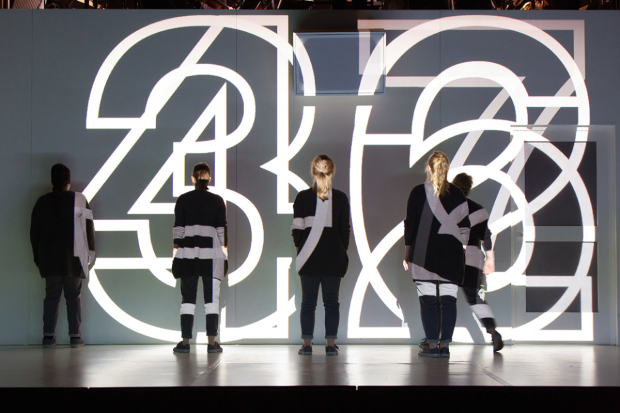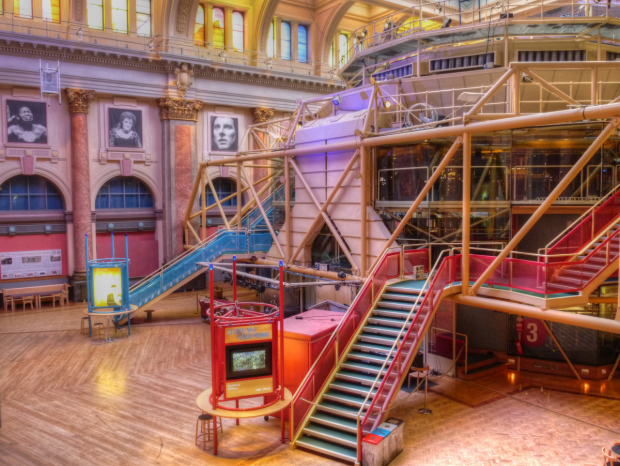Review: Jubilee (Manchester Royal Exchange)
There is an innate theatricality to Derek Jarman’s cult film. A punk classic celebrating its 40th anniversary next year, Jubilee zaps Queen Elizabeth I into a destitute contemporary Britain. Buckingham Palace has been sold off to a music label and turned into recording studios. The rest of the country has been left to rot and, in the wastelands, anarchic girl gangs and queer artists run riot, shagging and killing anything in sight. They could be the sisters of Anthony Burgess’ droogs – just better dressed.
Designer Chloe Lamford turns the whole Royal Exchange into their squat. Union Jacks are strewn from the balconies. Graffiti is scrawled all over the walls so that political slogans and swearwords fight for space. Two naked young men, Angel and Sphinx, cavort on a mattress, and a brassy young woman in a bright orange lifejacket blasts the audience with machine gun fire – that’s Mad. Others tear around in bondage gear and jumpsuits, croc shoes and both sorts of crown jewels. They’re a joyous and riotous bunch led by Travis Alabanza’s schoolmarmish Amyl Nitrate, our impish emcee for the evening dressed in baby pinks and pearls: "A f••klot’s happened since The End of History," they say.
Between them, this lot suffocate one-night-stands and harangue innocent waitresses, but they also throw vast queer, artsy parties and loll about in tender post-coital tangles. One picks up a brilliant busker – Yandass Ndlovu is charisma personified as the body-popping, poetry-spouting Kid. Another carves the word ‘F**k’ into her back. Violence and gentleness smack into each other; anarchy and kindness go head to head. Chinz mingles with chaos.
It adds up to a cock-eyed state of the nation piece that simultaneously celebrates and savages British identity. Like Jarman, director Chris Goode revels in misrule as civil society falls, yet he’s horrified by the prospect that violence might fill the vacuum. "Is it utopia? Is it dystopia?" Alabanza asks us flirtatiously. Can it be both? Either way, it’s a great fit for Brexit Britain – a nation teetering between collapse and rebirth.
Jubilee sits as awkwardly onstage as it did on screen. The raggedy rhythms and sensory overload turn it into pageant and Toyah Wilcox’s Queen Elizabeth ("Lizzie One Point Zero") sits in the theatre’s balcony in a white silk gown, imperious but intrigued, surveying the stage just as we do.
It’s 40 years since she played Mad, snarling and cackling down Jarman’s camera, and she wears the same neon orange eyeshadow as QE1 today. It’s a masterstroke of casting. Punk has grown up. Its endless present is the past – or is its past, its present? Whichever, it has its own royalty these days, advertising butter on ITV1. "If you were 15 in 1977," Alabanza’s Amyl chides us, "you’re 55 today. You’ve been running the show for years." In all likelihood, punks voted Leave.
Jubilee constantly questions itself as a result – and with it the very possibility of punk in the present. Is a revival of a punk classic radical or restorative? Is it anarchic or heritage? Goode toys with both, sometimes staging a re-enactment of the original, sometimes reinventing it. Where it tips into tribute act – Temi Wilkey gives good Toyah Wilcox as Mad and Lucy Ellinson impersonates her predecessor as performance artist Viv – it also insists on bringing in recent history from "Tony f**king Blair" to "David f**king Cameron."
Really, this is a kind of occupation – a gaggle of misfits, rebels and outsiders squatting the Royal Exchange stage. It claims a big public space to showcase alternative cultures and other possibilities of life, only Goode’s all too aware it’s been invited in. That paradox means Jubilee never fully works, but nor does it really want to either. That’s punk, darlings. That’s punk.
Jubilee runs at the Royal Exchange until 18 November and at the Lyric Hammersmith from 15 February to 10 March.












